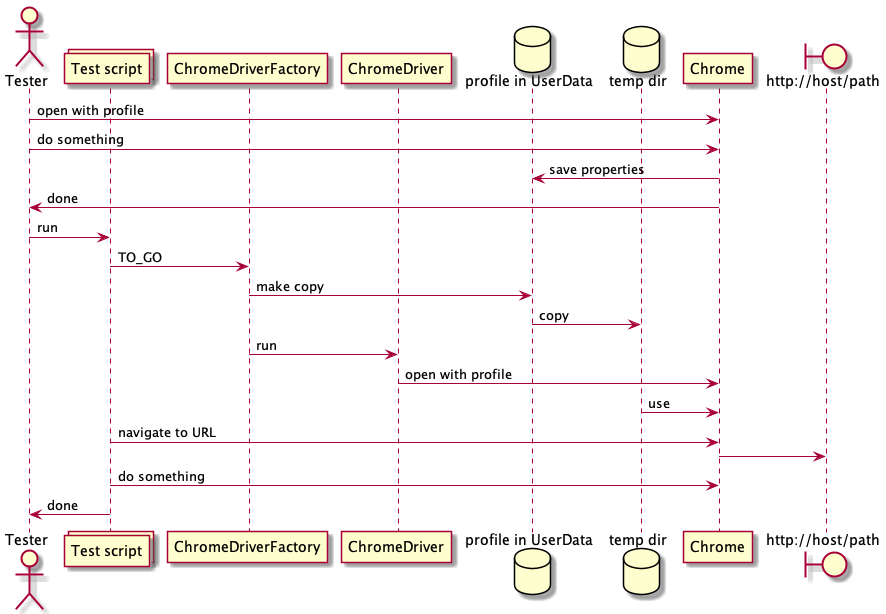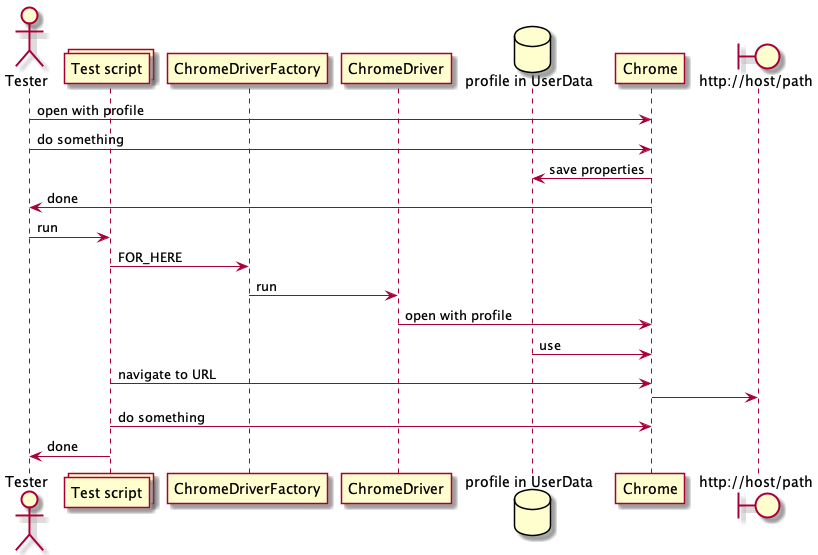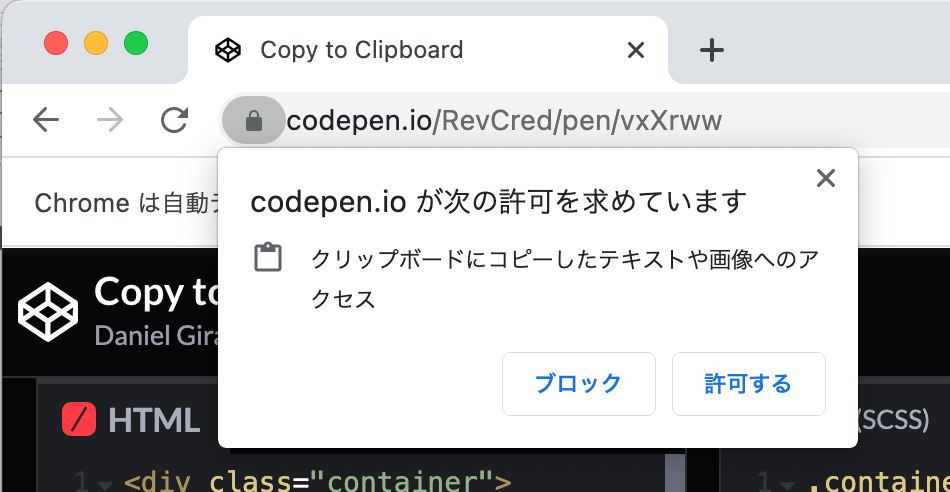chromedriverfactory
ChromeDriverFactory
>can go back to https://github.com/kazurayam/chromedriverfactory
chromedriverfactory is a Java/Groovy library that wraps org.openqa.selenium.webdriver.chrome.ChromeDriver.
It enables you to launch Chrome browser while specifying a “User Profile”, for example “Picasso”. And also you can launch Chrome browser while specifying a “Profile Directory Name”, for example “Default” or “Profile 1”.
Problem to solve
I want to use a User profile of Chrome browser, I want to save cookies in it. I want to carry the cookie over into a HTTP session between my selenium test script and Chrome browser. However it is difficult. Why? Have a look at a quotation from https://chromedriver.chromium.org/capabilities
By default, ChromeDriver will create a new temporary profile for each session. At times you may want to set special preferences or just use a custom profile altogether. If the former, you can use the ‘chrome.prefs’ capability (described later below) to specify preferences that will be applied after Chrome starts. If the latter, you can use the user-data-dir Chrome command-line switch to tell Chrome which profile to use:
I want to break this default behavior. I want to let ChromeDriver to use a profile which was prepared with contents as I wanted.
What is “user profile”, “user-data-dir” and “profile directory” in Chrome
What is “user profile” in Chrome browser? There are a few articles about it, for example
Solution description
I have developed a Java class com.kazurayam.webdriverfactory.ChromeDriverFactory.
With it, you can launch Chrome browser with “prepared User profile”.
You have an option where to find the profile directory:
-
UserDataAccess.TO_GO: ChromeDriverFactory allocates a new temporary directory and in there will create a profile directory. Then ChromeDriverFactory will copy the content of the genuine profile directory into the temporary directory. When you open Chrome with TO_GO option the process will run. However, all of session data saved into this temporary profile directory will be discarded (cookies, cached page resources, etc) when you close the session. -
UserDataAccess.FOR_HERE: ChromeDriverFactory tries to find the profile directory in the Chrome’s genuine “user-data-dir”. On Mac, it is/Users/myosusername/Library/Application Support/Google/Chrome/. A process of Chrome browser demands to lock the genuine profile directory. While a Chrome process is already running, when you try to open another Chrome with FOR_HERE option, the new comer process will fail.
Sequence diagrams
UserDataAccess.TO_GO

UserDataAccess.FOR_HERE

Sample codes
Launch Chrome browser without profile specified
Basic case where we launch Chrome browser without profile specified. The example includes how to launch Headless browser. Also includes how to position and resize the browser window.
package examples
import com.kazurayam.webdriverfactory.chrome.ChromeDriverFactory
import com.kazurayam.webdriverfactory.chrome.LaunchedChromeDriver
import io.github.bonigarcia.wdm.WebDriverManager
import org.junit.After
import org.junit.Before
import org.junit.BeforeClass
import org.junit.Test
class LaunchChromeWithoutProfile {
LaunchedChromeDriver launched
@Test
void test_launch_browser() {
ChromeDriverFactory factory = ChromeDriverFactory.newChromeDriverFactory()
launched = factory.newChromeDriver()
launched.getDriver().navigate().to("http://example.com")
Thread.sleep(1000)
}
@Test
void test_launch_headless_browser() {
ChromeDriverFactory factory = ChromeDriverFactory.newHeadlessChromeDriverFactory()
launched = factory.newChromeDriver()
launched.getDriver().navigate().to("http://example.com")
Thread.sleep(1000)
}
@BeforeClass
static void beforeClass() {
// setup the ChromeDriver binary
WebDriverManager.chromedriver().setup()
}
@Before
void setUp() {
launched = null
}
@After
void tearDown() {
if (launched != null) {
launched.getDriver().quit()
launched = null
}
}
}
Launch Chrome browser with UserProfile specified
package examples
import com.kazurayam.webdriverfactory.UserProfile
import com.kazurayam.webdriverfactory.chrome.ChromeDriverFactory
import com.kazurayam.webdriverfactory.chrome.LaunchedChromeDriver
import io.github.bonigarcia.wdm.WebDriverManager
import org.junit.After
import org.junit.Before
import org.junit.BeforeClass
import org.junit.Ignore
import org.junit.Test
class LaunchChromeWithUserProfile {
LaunchedChromeDriver launched
@Test
void test_launch_browser_with_profile() {
ChromeDriverFactory factory = ChromeDriverFactory.newChromeDriverFactory()
launched = factory.newChromeDriver(new UserProfile("Picasso"))
launched.getDriver().navigate().to("http://example.com")
Thread.sleep(1000)
}
@Test
void test_launch_browser_with_profile_TO_GO() {
ChromeDriverFactory factory = ChromeDriverFactory.newChromeDriverFactory()
launched = factory.newChromeDriver(
new UserProfile("Picasso"),
ChromeDriverFactory.UserDataAccess.TO_GO)
launched.getDriver().navigate().to("http://example.com")
Thread.sleep(1000)
}
@Ignore
@Test
void test_launch_browser_with_profile_FOR_HERE() {
ChromeDriverFactory factory = ChromeDriverFactory.newChromeDriverFactory()
launched = factory.newChromeDriver(
new UserProfile("Picasso"),
ChromeDriverFactory.UserDataAccess.FOR_HERE)
launched.getDriver().navigate().to("http://example.com")
Thread.sleep(1000)
}
@BeforeClass
static void beforeClass() {
// setup the ChromeDriver binary
WebDriverManager.chromedriver().setup()
}
@Before
void setUp() {
launched = null
}
@After
void tearDown() {
if (launched != null) {
launched.getDriver().quit()
launched = null
}
}
}
TO_GO
When UserDataAccess.TO_GO is specified,
ChromeDriverFactory will let ChromeDriver to generate a commandline to start Chrome browser as follows for example on my Mac:
Please note that the --user-data-dir option is given with a temporary directory.
/Applications/Google Chrome.app/Contents/MacOS/Google Chrome --allow-pre-commit-input --disable-background-networking --disable-client-side-phishing-detection --disable-default-apps --disable-dev-shm-usage --disable-gpu --disable-hang-monitor --disable-infobars --disable-popup-blocking --disable-prompt-on-repost --disable-sync --disableExtensions --enable-automation --enable-blink-features=ShadowDOMV0 --enable-logging --log-level=0 --no-first-run --no-sandbox --no-service-autorun --password-store=basic --profile-directory=Profile 14 --remote-debugging-port=0 --test-type=webdriver --use-mock-keychain
--user-data-dir=/var/folders/7m/lm7d6nx51kj0kbtnsskz6r3m0000gn/T/__user-data-dir__7501750884155054730 --window-size=1024,768 --flag-switches-begin --flag-switches-end
FOR_HERE
When UserDataAccess.FOR_HERE is specified,
ChromeDriverFactory will let ChromeDriver to generate a commandline to start Chrome browser as follows for example on my Mac:
Please note that the --user-data-dir option is given with a path of “genuine User Data directory”, which will be locked by a running Chrome process.
/Applications/Google Chrome.app/Contents/MacOS/Google Chrome --allow-pre-commit-input --disable-background-networking --disable-client-side-phishing-detection --disable-default-apps --disable-dev-shm-usage --disable-gpu --disable-hang-monitor --disable-infobars --disable-popup-blocking --disable-prompt-on-repost --disable-sync --disableExtensions --enable-automation --enable-blink-features=ShadowDOMV0 --enable-logging --log-level=0 --no-first-run --no-sandbox --no-service-autorun --password-store=basic --profile-directory=Profile 14 --remote-debugging-port=0 --test-type=webdriver --use-mock-keychain
--user-data-dir=/Users/kazuakiurayama/Library/Application Support/Google/Chrome --window-size=1024,768 --flag-switches-begin --flag-switches-end
Caution
Chrome browser is very strict that only 1 process of Chrome can
have access to the “genuine User Data directory”. If you have
one Chrome window already opened when you try to launch one more Chrome process with UserDataAccess.FOR_HERE,
then that attempt will fail with a message:
targetUserDataDir="/Users/username/Library/Application Support/Google/Chrome"
profileDirectoryName="Profile 14"
org.openqa.selenium.InvalidArgumentException was thrown.
Exception message:
invalid argument: user data directory is already in use, please specify a unique value for --user-data-dir argument, or don't use --user-data-dir
As countermeasures you have 2 options.
-
close all Chrome windows before running your test, or
-
your test uses
UserDataAccess.TO_GOinstead
Launch Headless Chrome with ProfileDirectoryName specified
package examples
import com.kazurayam.webdriverfactory.chrome.ChromeDriverFactory
import com.kazurayam.webdriverfactory.chrome.LaunchedChromeDriver
import com.kazurayam.webdriverfactory.ProfileDirectoryName
import io.github.bonigarcia.wdm.WebDriverManager
import org.junit.After
import org.junit.Before
import org.junit.BeforeClass
import org.junit.Ignore
import org.junit.Test
class LaunchChromeWithProfileDirectory {
LaunchedChromeDriver launched
@Test
void test_launch_browser_with_profile_directory() {
ChromeDriverFactory factory = ChromeDriverFactory.newChromeDriverFactory()
launched = factory.newChromeDriver(new ProfileDirectoryName("Profile 6"))
launched.getDriver().navigate().to("http://example.com")
Thread.sleep(1000)
}
@Test
void test_launch_browser_with_profile_TO_GO() {
ChromeDriverFactory factory = ChromeDriverFactory.newChromeDriverFactory()
launched = factory.newChromeDriver(
new ProfileDirectoryName("Profile 6"),
ChromeDriverFactory.UserDataAccess.TO_GO)
launched.getDriver().navigate().to("http://example.com")
Thread.sleep(1000)
}
@Ignore
@Test
void test_launch_browser_with_profile_FOR_HERE() {
ChromeDriverFactory factory = ChromeDriverFactory.newChromeDriverFactory()
launched = factory.newChromeDriver(
new ProfileDirectoryName("Profile 6"),
ChromeDriverFactory.UserDataAccess.FOR_HERE)
launched.getDriver().navigate().to("http://example.com")
Thread.sleep(1000)
}
@BeforeClass
static void beforeClass() {
// setup the ChromeDriver binary
WebDriverManager.chromedriver().setup()
}
@Before
void setUp() {
launched = null
}
@After
void tearDown() {
if (launched != null) {
launched.getDriver().quit()
launched = null
}
}
}
print the DesiredCapabilities employed to open a Chrome
package examples
import com.kazurayam.webdriverfactory.chrome.ChromeDriverFactory
import com.kazurayam.webdriverfactory.chrome.ChromeOptionsModifiers
import com.kazurayam.webdriverfactory.chrome.LaunchedChromeDriver
import io.github.bonigarcia.wdm.WebDriverManager
import org.junit.After
import org.junit.Before
import org.junit.BeforeClass
import org.junit.Test
import org.openqa.selenium.chrome.ChromeOptions
class PrintEmployedOptions {
LaunchedChromeDriver launched
@Test
void test_getEmployedOptions() {
ChromeDriverFactory factory = ChromeDriverFactory.newHeadlessChromeDriverFactory()
factory.addChromeOptionsModifier(ChromeOptionsModifiers.incognito())
launched = factory.newChromeDriver()
launched.getEmployedOptions().ifPresent { ChromeOptions options ->
println options
}
launched.getEmployedOptionsAsJSON().ifPresent { String json ->
println json
assert json.contains("incognito")
}
}
@BeforeClass
static void beforeClass() {
// setup the ChromeDriver binary
WebDriverManager.chromedriver().setup()
}
@Before
void setUp() {
launched = null
}
@After
void tearDown() {
if (launched != null) {
launched.getDriver().quit()
launched = null
}
}
}
This emits:
{
"acceptSslCerts": true,
"browserName": "chrome",
"goog:chromeOptions": {
"args": [
"window-size=1024,768",
"--no-sandbox",
"disable-infobars",
"disable-gpu",
"disable-dev-shm-usage",
"--incognito"
],
"extensions": [
],
"prefs": {
"plugins.plugins_disabled": [
"Adobe Flash Player",
"Chrome PDF Viewer"
],
"profile.default_content_settings.popups": 0,
"download.prompt_for_download": false,
"download.default_directory": "/Users/kazuakiurayama/Downloads"
}
}
}
print UserProfile, ProfileDirectoryName, UserDataDir used to launche a Chrome
package examples
import com.kazurayam.webdriverfactory.chrome.ChromeDriverFactory
import com.kazurayam.webdriverfactory.chrome.ChromeOptionsModifiers
import com.kazurayam.webdriverfactory.chrome.ChromeUserProfile
import com.kazurayam.webdriverfactory.chrome.LaunchedChromeDriver
import com.kazurayam.webdriverfactory.ProfileDirectoryName
import io.github.bonigarcia.wdm.WebDriverManager
import org.junit.After
import org.junit.Before
import org.junit.BeforeClass
import org.junit.Test
import static org.junit.Assert.assertTrue
class PrintWebDriverMetadata {
LaunchedChromeDriver launched
@Test
void test_printUserProfile() {
ChromeDriverFactory factory = ChromeDriverFactory.newChromeDriverFactory()
factory.addChromeOptionsModifier(ChromeOptionsModifiers.incognito())
launched = factory.newChromeDriver(new ProfileDirectoryName("Default"),
ChromeDriverFactory.UserDataAccess.TO_GO)
assertTrue(launched.getChromeUserProfile().isPresent())
assertTrue(launched.getInstruction().isPresent())
launched.getChromeUserProfile().ifPresent({ ChromeUserProfile cup ->
println "ChromeUserProfile : " + cup
})
launched.getInstruction().ifPresent({ ChromeDriverFactory.UserDataAccess instruction ->
println "UserDataAccess: " + instruction
})
}
@BeforeClass
static void beforeClass() {
// setup the ChromeDriver binary
WebDriverManager.chromedriver().setup()
}
@Before
void setUp() {
launched = null
}
@After
void tearDown() {
if (launched != null) {
launched.getDriver().quit()
launched = null
}
}
}
This emits
ChromeUserProfile : {
"userProfile": "kazurayam",
"userDataDir": "/var/folders/lh/jkh513dn7f3c0j09z131g1z00000gn/T/__user-data-dir__7144377108201112266",
"profileDirectoryName": "Default"
}
UserDataAccess: TO_GO
Getting Clipboard content from remote Selenium Chrome node
Have a look at the following web site:
in there you will find a button:

If you click this button, the URL string displayed on the left of the button will be written into the OS Clipboard. The URL string may change. So a tester of this page would want to read the content text of the clipboard. He/she would want to get text out of the OS clipboard into his/her selenium test script and verify if the value is appropriate.
How to implement this testing story?
-
My Selenium test script will open the page in a Chrome browser, find the button element, and click it. Then a text will be written in the OS clipboard.
-
My test script will execute a JavaScript script inside Chrome:
return navigator.clipboard.readText();
-
WebDriver will return a text read out of the clipboard.
-
My test script will accept the returned value and do whatever verification.
Here arises a difficulty. Chrome browser blocks my script. Chrome won’t let my javascript to read the clipboard. Chrome will prompt a dialog and as me if I grand the javascript to read the OS clipboard:

I wanted to automate my test entirely. I wanted to configure Chrome NOT to elicit that disturbing prompt. The following article explained how to configure Chrome’s preference.
“Getting Clipboard Contet from Remote Selenium Chrome Nodes”, AMIT RAWAT
So, I have implemented a built-in support of “granting access to Clipboard” built in my chromedriverfactory.
Here is a sample code:
package examples;
import com.kazurayam.webdriverfactory.chrome.ChromeDriverFactory;
import com.kazurayam.webdriverfactory.chrome.ChromePreferencesModifiers;
import com.kazurayam.webdriverfactory.chrome.LaunchedChromeDriver;
import io.github.bonigarcia.wdm.WebDriverManager;
import org.junit.After;
import org.junit.Before;
import org.junit.BeforeClass;
import org.junit.Test;
import org.openqa.selenium.By;
import org.openqa.selenium.JavascriptExecutor;
import org.openqa.selenium.WebDriver;
import org.openqa.selenium.WebElement;
import java.io.IOException;
import java.util.concurrent.TimeUnit;
/**
* An implementation of a Tips suggested at
* [Getting Clipboard content from remote Selenium Chrome Nodes](https://sahajamit.medium.com/getting-clipboard-content-from-remote-selenium-chrome-nodes-67a4c4d862bd)
* by AMIT RAWAT
*
* Some web page has a button labeled "copy link".
* Here is an example:
* https://codepen.io/RevCred/pen/vxXrww
* If you click the button, a URL is copied into the clipboard of the machine
* on which the browser is working.
*
* Now I want to write a Selenium test case which verifies
* if the URL written into the clipboard matches is as expected or not.
*
* In order to do that, I need to read the clipboard content and
* transfer the text back to the test case script.
* You can use JavaScript's Clipboard.readText()
* https://developer.mozilla.org/en-US/docs/Web/API/Clipboard/readText
*
* When you try to call Clipboard.readText() from your Selenium test,
* you would be blocked by a Dialog from browser. Browser ask you if
* you grant JavaScript to get access to the clipboard or not.
*
* The above-mentioned article explains that you can grant it by
* setting the Chrome preference `profile.content_settings.exceptions.clipboard`
* What this test case does?
* 1. It opens a Chrome browser specifying a configures preference
* 2. It visits the target page "https://codepen.io/RevCred/pen/vxXrww"
* 3. It clicks the button. By this, a URL string will be written into the OS clipboard
* 4. It sends a JavaScript script to the Chrome browser;
* Chrome will execute the script;
* The JavaScript will return a URL string back to the test script.
* 5. It verifies if the returned URL string is equal to the expected.
*/
public class GettingClipboardContent {
private final String targetURL = "https://codepen.io/RevCred/pen/vxXrww";
private final String iframeLocator = "//iframe[@id='result']";
private final String buttonLocator = "//div[@id='copy']";
private WebDriver driver;
@BeforeClass
public static void beforeClass() {
// setup the ChromeDriver binary
WebDriverManager.chromedriver().setup();
}
@Before
public void setup() throws IOException {
ChromeDriverFactory factory =
ChromeDriverFactory.newChromeDriverFactory();
// modify Chrome Preferences to grant access to Clipboard
factory.addChromePreferencesModifier(
ChromePreferencesModifiers.grantAccessToClipboard());
LaunchedChromeDriver launched = factory.newChromeDriver();
driver = launched.getDriver();
driver.manage().timeouts().implicitlyWait(10, TimeUnit.SECONDS);
}
@Test
public void testReadingClipboard() throws InterruptedException {
driver.navigate().to(targetURL);
WebElement iframe = driver.findElement(By.xpath(iframeLocator));
driver.switchTo().frame(iframe);
WebElement button = driver.findElement(By.xpath(buttonLocator));
button.click();
Thread.sleep(1 * 1000);
if (driver instanceof JavascriptExecutor) {
JavascriptExecutor js = (JavascriptExecutor)driver;
Object val = js.executeScript("return navigator.clipboard.readText();");
if (val instanceof String) {
String text = (String)val;
System.out.println("*** Text out of clipboard: " + text);
assert text.startsWith("https://staging.revolutioncredit.com/signupc/");
}
}
}
@After
public void teardown() {
driver.quit();
}
}